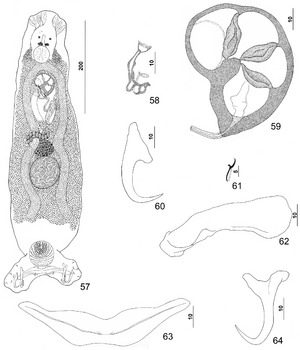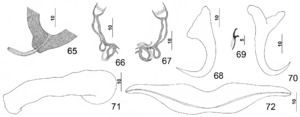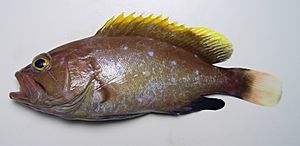Pseudorhabdosynochus firmicoleatus facts for kids
Quick facts for kids Pseudorhabdosynochus firmicoleatus |
|
|---|---|
 |
|
| Body and sclerotised parts | |
| Scientific classification | |
| Kingdom: | |
| Phylum: | |
| Class: | |
| Subclass: |
Monopisthocotylea
|
| Family: |
Diplectanidae
|
| Genus: |
Pseudorhabdosynochus
|
| Species: |
P. firmicoleatus
|
| Binomial name | |
| Pseudorhabdosynochus firmicoleatus Kritsky, Bakenhaster & Adams, 2015
|
|
Pseudorhabdosynochus firmicoleatus is a tiny parasite that lives on the gills of certain fish. It belongs to a group of flatworms called Monogenea. This specific parasite was first discovered and described by scientists Kritsky, Bakenhaster, and Adams in 2015. It likes to live on the Yellowedge grouper and the Snowy grouper.
Contents
What is Pseudorhabdosynochus firmicoleatus?
Pseudorhabdosynochus firmicoleatus is a very small monogenean flatworm. It is only about 400 to 500 micrometers long. To give you an idea, a micrometer is one-millionth of a meter! This means it's too small to see without a microscope.
How does it attach to fish?
Like other members of its family, Pseudorhabdosynochus firmicoleatus has a flat body. It has a special organ at its back called a haptor. This haptor helps the parasite stick firmly to the gills of its host fish. The haptor has two disc-like structures called squamodiscs, one on its belly side and one on its back side. These discs help it grip on tight.
Where does this parasite live?
This tiny parasite has been found living on the gills of two types of fish:
- The Yellowedge grouper (Epinephelus flavolimbatus)
- The Snowy grouper (Epinephelus niveatus)
Where was it first found?
The first time Pseudorhabdosynochus firmicoleatus was discovered was in the open Gulf of Mexico. This location was about 70 miles south of Panama City, Florida. Later, it was also found on Snowy groupers in the Gulf of Mexico, about 60 miles southwest of Pensacola, Florida.



